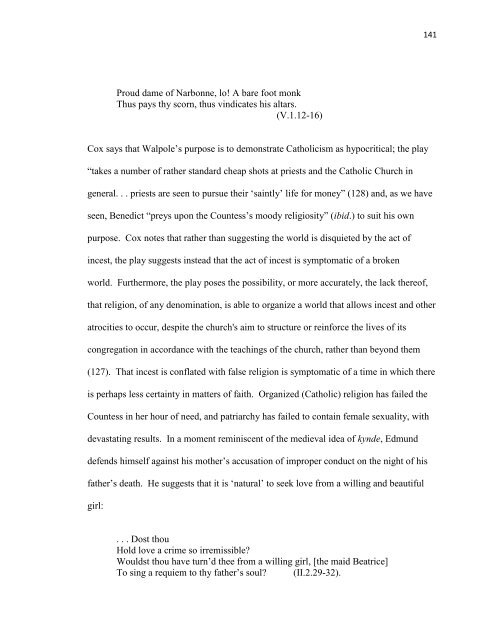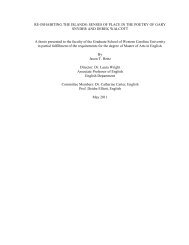SUMMERS, KAREN CRADY, Ph.D. Reading Incest - The University ...
SUMMERS, KAREN CRADY, Ph.D. Reading Incest - The University ...
SUMMERS, KAREN CRADY, Ph.D. Reading Incest - The University ...
Create successful ePaper yourself
Turn your PDF publications into a flip-book with our unique Google optimized e-Paper software.
141<br />
Proud dame of Narbonne, lo! A bare foot monk<br />
Thus pays thy scorn, thus vindicates his altars.<br />
(V.1.12-16)<br />
Cox says that Walpole’s purpose is to demonstrate Catholicism as hypocritical; the play<br />
“takes a number of rather standard cheap shots at priests and the Catholic Church in<br />
general. . . priests are seen to pursue their ‘saintly’ life for money” (128) and, as we have<br />
seen, Benedict “preys upon the Countess’s moody religiosity” (ibid.) to suit his own<br />
purpose. Cox notes that rather than suggesting the world is disquieted by the act of<br />
incest, the play suggests instead that the act of incest is symptomatic of a broken<br />
world. Furthermore, the play poses the possibility, or more accurately, the lack thereof,<br />
that religion, of any denomination, is able to organize a world that allows incest and other<br />
atrocities to occur, despite the church's aim to structure or reinforce the lives of its<br />
congregation in accordance with the teachings of the church, rather than beyond them<br />
(127). That incest is conflated with false religion is symptomatic of a time in which there<br />
is perhaps less certainty in matters of faith. Organized (Catholic) religion has failed the<br />
Countess in her hour of need, and patriarchy has failed to contain female sexuality, with<br />
devastating results. In a moment reminiscent of the medieval idea of kynde, Edmund<br />
defends himself against his mother’s accusation of improper conduct on the night of his<br />
father’s death. He suggests that it is ‘natural’ to seek love from a willing and beautiful<br />
girl:<br />
. . . Dost thou<br />
Hold love a crime so irremissible?<br />
Wouldst thou have turn’d thee from a willing girl, [the maid Beatrice]<br />
To sing a requiem to thy father’s soul? (II.2.29-32).
















